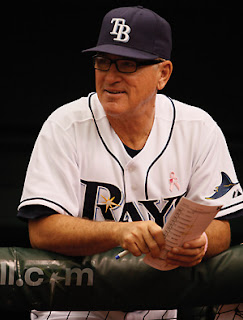Showing up players
June 8, 2011 by Coach McCreary
Filed under Coaching
Coaches at all levels routinely teach their players to not “show up” umpires and their teammates during a game. A player needs to keep his cool and move on if an umpire makes a questionable call. A pitcher has to keep his poise and move on if a teammate makes a bad error behind him. But do coaches follow these same rules? Unfortunately, many do not. The reactions that coaches have to bad calls and errors in many cases are in direct opposition to how we want our players to handle these situations.
 |
| A “players’ manager” demands respect for the game but is willing to give it to the players as well. |
I had a manager at the professional level who had only two rules. Be on time and don’t show him up. “Showing him up” could take any form from a player not running a ball out to a pitcher arguing with him on the mound upon taking him out. Basically, any disrespect towards him directly or towards the proper way of playing the game were ways to “show up” a manager in his view. In return, however, the manager would not show you up either. Think about the following:
How do you visibly react when …
- The pitcher walks the lead-off man in a tie game?
- An infielder makes a bad error?
- The batter takes a fastball right down the middle with the bases loaded?
- The runner misses a sign?
- The pitcher forgets to cover first base?
Players know when they screw up. They don’t need to see a coach throw his hands up or stomp around the dugout to realize a mistake was made. A coach who does this is showing his players up. If you are a coach, how would you react if you sent a player home from third and he got thrown out by 20 feet and the runner stared at you and threw his arms up in disgust. My guess is that you would have a conversation with that player. So why do coaches do it? If you want players to keep their poise and handle adversity well, start with modeling it yourself. It’s certainly not easy and I’ve been guilty of it myself, but it’s something that coaches should try to improve upon along with the players. A player who has made a mistake and sees a coach react in a calm, positive way will want to continue to play for that coach.
Coaches do not want to be shown up … but neither do the players.





Leave a Reply